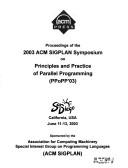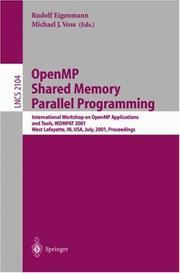| Listing 1 - 10 of 14 | << page >> |
Sort by
|
Book
Year: 2004 Publisher: [Place of publication not identified] IEEE Computer Society Press
Abstract | Keywords | Export | Availability | Bookmark
 Loading...
Loading...Choose an application
- Reference Manager
- EndNote
- RefWorks (Direct export to RefWorks)
Book
Year: 2019 Publisher: New York, New York : Association for Computing Machinery,
Abstract | Keywords | Export | Availability | Bookmark
 Loading...
Loading...Choose an application
- Reference Manager
- EndNote
- RefWorks (Direct export to RefWorks)
Book
Year: 2004 Publisher: [Place of publication not identified] IEEE Computer Society Press
Abstract | Keywords | Export | Availability | Bookmark
 Loading...
Loading...Choose an application
- Reference Manager
- EndNote
- RefWorks (Direct export to RefWorks)
Digital
ISBN: 9783540795612 Year: 2008 Publisher: Berlin, Heidelberg Springer-Verlag Berlin Heidelberg
Abstract | Keywords | Export | Availability | Bookmark
 Loading...
Loading...Choose an application
- Reference Manager
- EndNote
- RefWorks (Direct export to RefWorks)
Complex analysis --- Computer science --- Programming --- Artificial intelligence. Robotics. Simulation. Graphics --- Computer. Automation --- complexe analyse (wiskunde) --- vormgeving --- informatica --- simulaties --- programmeren (informatica) --- wiskunde --- software engineering
Digital
ISBN: 9783540318132 Year: 2005 Publisher: Berlin Heidelberg Springer-Verlag GmbH
Abstract | Keywords | Export | Availability | Bookmark
 Loading...
Loading...Choose an application
- Reference Manager
- EndNote
- RefWorks (Direct export to RefWorks)
Mathematical logic --- Mathematics --- Computer science --- Programming --- Computer architecture. Operating systems --- informatica --- programmeren (informatica) --- database management --- programmeertalen --- programmatielogica --- logica --- computernetwerken
Book
ISBN: 9783540795605 354079560X 3540795618 Year: 2008 Publisher: Berlin ; New York : Springer,
Abstract | Keywords | Export | Availability | Bookmark
 Loading...
Loading...Choose an application
- Reference Manager
- EndNote
- RefWorks (Direct export to RefWorks)
OpenMP is a widely accepted, standard application programming interface (API) for high-level shared-memory parallel programming in Fortran, C, and C++. Since its introduction in 1997, OpenMP has gained support from most high-performance compiler and hardware vendors. Under the direction of the OpenMP Architecture Review Board (ARB), the OpenMP speci?cation has evolved, including the - cent release of Speci?cation 3. 0. Active research in OpenMP compilers, runtime systems, tools, and environments drives its evolution, including new features such as tasking. The community of OpenMP researchers and developers in academia and - dustry is united under cOMPunity (www. compunity. org). This organaization has held workshops on OpenMP around the world since 1999: the European Wo- shop on OpenMP (EWOMP), the North American Workshop on OpenMP App- cations and Tools (WOMPAT), and the Asian Workshop on OpenMP Experiences and Implementation (WOMPEI) attracted annual audiences from academia and industry. The International Workshop on OpenMP (IWOMP) consolidated these three workshop series into a single annual international event that rotates across the previous workshop sites. The ?rst IWOMP meeting was held in 2005, in - gene, Oregon, USA. IWOMP 2006 took place in Reims, France, and IWOMP 2007 in Beijing, China. Each workshop drew over 60 participants from research and - dustry throughout the world. IWOMP 2008 continued the series with technical papers, panels, tutorials, and OpenMP status reports. The ?rst IWOMP wo- shop was organized under the auspices of cOMPunity.
Parallel programming (Computer science) --- Programmation parallèle (Informatique) --- Congresses. --- Congrès --- Application program interfaces (Computer software) --- Computer Science --- Engineering & Applied Sciences --- Information Technology --- Computer Science (Hardware & Networks) --- APIs (Computer software) --- Interfaces, Application program (Computer software) --- Computer science. --- Architecture, Computer. --- Computer programming. --- Software engineering. --- Algorithms. --- Computer science --- Computer simulation. --- Computer Science. --- Computer System Implementation. --- Programming Techniques. --- Software Engineering. --- Algorithm Analysis and Problem Complexity. --- Mathematics of Computing. --- Simulation and Modeling. --- Mathematics. --- Computer modeling --- Computer models --- Modeling, Computer --- Models, Computer --- Simulation, Computer --- Electromechanical analogies --- Mathematical models --- Simulation methods --- Model-integrated computing --- Computer mathematics --- Discrete mathematics --- Electronic data processing --- Algorism --- Algebra --- Arithmetic --- Computer software engineering --- Engineering --- Computers --- Electronic computer programming --- Electronic digital computers --- Programming (Electronic computers) --- Coding theory --- Architecture, Computer --- Informatics --- Science --- Mathematics --- Foundations --- Programming --- Application software --- Computer network architectures. --- Computer software. --- Software, Computer --- Computer systems --- Architectures, Computer network --- Network architectures, Computer --- Computer architecture --- Computer science—Mathematics.
Book
ISBN: 9783540318132 Year: 2005 Publisher: Berlin Heidelberg Springer-Verlag GmbH.
Abstract | Keywords | Export | Availability | Bookmark
 Loading...
Loading...Choose an application
- Reference Manager
- EndNote
- RefWorks (Direct export to RefWorks)
The 17th International Workshop on Languages and Compilers for High P- formance Computing was hosted by Purdue University in September 2004 on Purdue campus in West Lafayette, Indiana, USA. The workshop is an annual international forum for leading research groups to present their current research activities and the latest results, covering languages, compiler techniques, r- time environments, and compiler-related performance evaluation for parallel and high-performance computing. Eighty-six researchers from Canada, France, Japan, Korea, P. R. China, Spain, Taiwan and the United States attended the workshop. A new feature of LCPC 2004 was its mini-workshop on Research-Compiler Infrastructures. Representatives from four projects, namely Cetus, LLVM, ORC and Trimaran, gavea 90-minute long presentation each. In addition, 29 research papers were presented at the workshop. These papers were reviewed by the p- gram committee. External reviewers were used as needed. The authors received additional comments during the workshop. The revisions after the workshop are now assembled into these ?nal proceedings. A panel sessionwasorganizedby Samuel Midki? onthe questionof What is GoodCompilerResearch-Theory,PracticeorComplexity? Theworkshopalso had the honor and pleasure to have two keynote speakers, Peter Kogge of the University of Notre Dame and David Kuck of Intel Inc., both pioneers in high performance computing. Peter Kogge gave a presentation titled Architectures and Execution Models: How New Technologies May A?ect How LanguagesPlay on Future HPC Systems . David Kuck presented Intel's vision and roadmap for parallel and distributed solutions.
Mathematical logic --- Mathematics --- Computer science --- Programming --- Computer architecture. Operating systems --- informatica --- programmeren (informatica) --- database management --- programmeertalen --- programmatielogica --- logica --- computernetwerken
Book
ISBN: 9783540795612 Year: 2008 Publisher: Berlin, Heidelberg Springer-Verlag Berlin Heidelberg
Abstract | Keywords | Export | Availability | Bookmark
 Loading...
Loading...Choose an application
- Reference Manager
- EndNote
- RefWorks (Direct export to RefWorks)
OpenMP is a widely accepted, standard application programming interface (API) for high-level shared-memory parallel programming in Fortran, C, and C++. Since its introduction in 1997, OpenMP has gained support from most high-performance compiler and hardware vendors. Under the direction of the OpenMP Architecture Review Board (ARB), the OpenMP speci?cation has evolved, including the - cent release of Speci?cation 3. 0. Active research in OpenMP compilers, runtime systems, tools, and environments drives its evolution, including new features such as tasking. The community of OpenMP researchers and developers in academia and - dustry is united under cOMPunity (www. compunity. org). This organaization has held workshops on OpenMP around the world since 1999: the European Wo- shop on OpenMP (EWOMP), the North American Workshop on OpenMP App- cations and Tools (WOMPAT), and the Asian Workshop on OpenMP Experiences and Implementation (WOMPEI) attracted annual audiences from academia and industry. The International Workshop on OpenMP (IWOMP) consolidated these three workshop series into a single annual international event that rotates across the previous workshop sites. The ?rst IWOMP meeting was held in 2005, in - gene, Oregon, USA. IWOMP 2006 took place in Reims, France, and IWOMP 2007 in Beijing, China. Each workshop drew over 60 participants from research and - dustry throughout the world. IWOMP 2008 continued the series with technical papers, panels, tutorials, and OpenMP status reports. The ?rst IWOMP wo- shop was organized under the auspices of cOMPunity.
Complex analysis --- Computer science --- Programming --- Artificial intelligence. Robotics. Simulation. Graphics --- Computer. Automation --- complexe analyse (wiskunde) --- vormgeving --- informatica --- simulaties --- programmeren (informatica) --- wiskunde --- software engineering

ISBN: 1581135882 Year: 2003 Publisher: ACM
Abstract | Keywords | Export | Availability | Bookmark
 Loading...
Loading...Choose an application
- Reference Manager
- EndNote
- RefWorks (Direct export to RefWorks)

ISBN: 354042346X 3540445870 Year: 2001 Publisher: Berlin, Heidelberg : Springer Berlin Heidelberg : Imprint: Springer,
Abstract | Keywords | Export | Availability | Bookmark
 Loading...
Loading...Choose an application
- Reference Manager
- EndNote
- RefWorks (Direct export to RefWorks)
This book contains the presentations given at the Workshop on OpenMP App- cations and Tools, WOMPAT 2001. The workshop was held on July 30 and 31, 2001 at Purdue University, West Lafayette, Indiana, USA. It brought together designers, users, and researchers of the OpenMP application programming int- face. OpenMP has emerged as the standard for shared memory parallel progr- ming. For the rst time, it is possible to write parallel programs that are portable across the majority of shared memory parallel computers. WOMPAT 2001 s- ved as a forum for all those interested in OpenMP and allowed them to meet, share ideas and experiences, and discuss the latest developments of OpenMP and its applications. WOMPAT 2001 was co-sponsored by the OpenMP Architecture Review Board (ARB). It followed a series of workshops on OpenMP, including WOMPAT 2000, EWOMP 2000, and WOMPEI 2000. For WOMPAT 2001, we solicited papers formally and published them in the form of this book. The authors submitted extended abstracts, which were reviewed by the program committee. All submitted papers were accepted. The authors were asked to prepare a nal paper in which they addressed the reviewers comments. The proceedings, in the form of this book, were created in time to be available at the workshop. In this way, we hope to have brought out a timely report of ongoing OpenMP-related research and development e orts as well as ideas for future improvements.
Parallel programming (Computer science) --- Computer Science --- Engineering & Applied Sciences --- Computer science. --- Computer organization. --- Architecture, Computer. --- Software engineering. --- Computers. --- Computer science --- Computer mathematics. --- Computer Science. --- Theory of Computation. --- Computer System Implementation. --- Software Engineering/Programming and Operating Systems. --- Computer Systems Organization and Communication Networks. --- Discrete Mathematics in Computer Science. --- Computational Mathematics and Numerical Analysis. --- Mathematics. --- Information theory. --- Computer network architectures. --- Computational complexity. --- Computer mathematics --- Discrete mathematics --- Electronic data processing --- Complexity, Computational --- Machine theory --- Computer software engineering --- Engineering --- Architectures, Computer network --- Network architectures, Computer --- Computer architecture --- Communication theory --- Communication --- Cybernetics --- Mathematics --- Computer science—Mathematics. --- Organization, Computer --- Electronic digital computers --- Architecture, Computer --- Automatic computers --- Automatic data processors --- Computer hardware --- Computing machines (Computers) --- Electronic brains --- Electronic calculating-machines --- Electronic computers --- Hardware, Computer --- Computer systems --- Calculators --- Cyberspace
| Listing 1 - 10 of 14 | << page >> |
Sort by
|

 Search
Search Feedback
Feedback About UniCat
About UniCat  Help
Help News
News